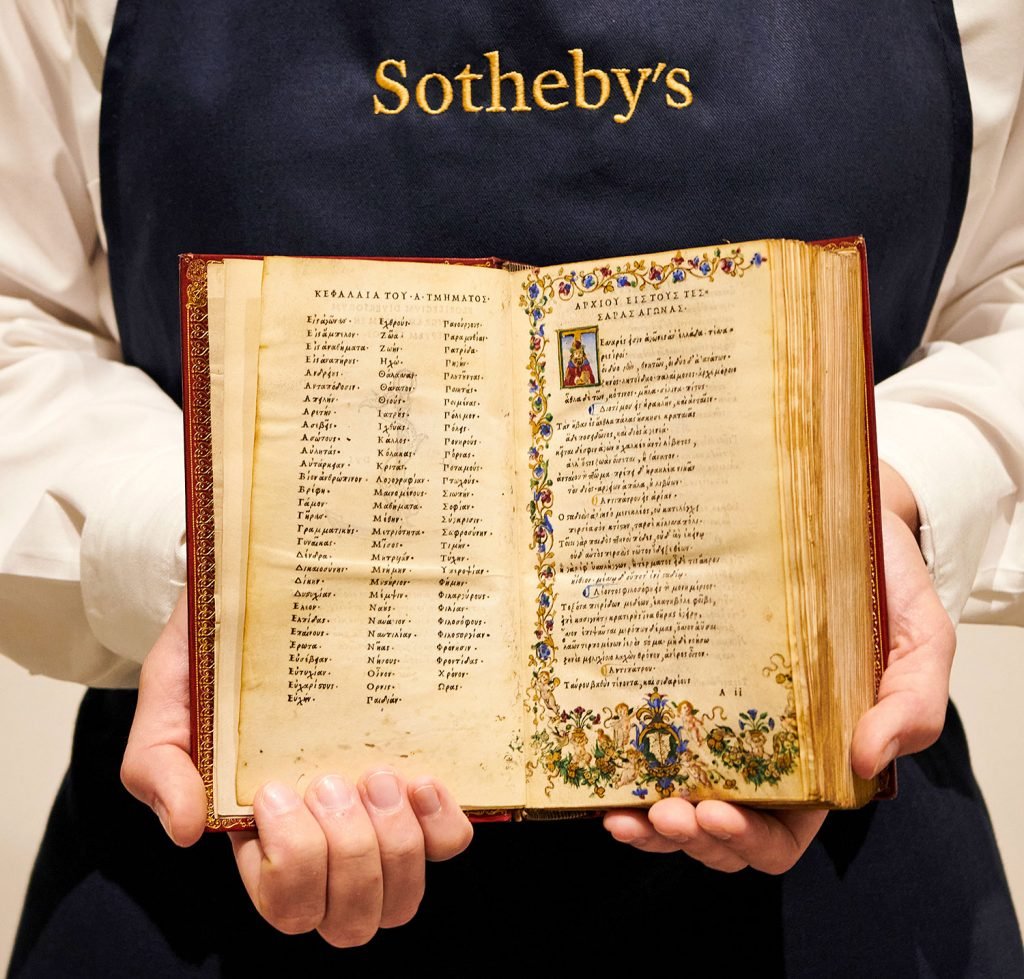A treasure trove of 16th-century Renaissance books in their original bindings is expected to fetch $25 million when it goes on Sotheby’s block beginning in October, with price estimates ranging from $200 to $600,000.
The books and bindings are culled from the collection of T. Kimball Brooker, an American bibliophile and scholar who amassed more than 1,300 titles over six decades to create one of the most important rare-book libraries to ever reach auction. The library sits at the crux of art, architecture, and knowledge in the Renaissance era, and is considered the finest collection to exist outside Europe.
One highlight from the sale is an early manuscript of Leonardo da Vinci’s Treatise on Painting, containing all of its original 375 chapters and 56 illustrations in ink. Following Leonardo’s death in 1519, the Italian polymath’s loose manuscripts were gathered by his lifelong companion Francesco Melzi, who marked the passages related to painting and copied them, with their corresponding drawings, in a codex now owned by the Vatican Library. The abridged version up for sale, made between 1638–41 in the atelier of Cassiano dal Pozzo, was stripped of “potentially heretical passages,” according to Sotheby’s. It is expected to fetch $120,000–$180,000.

The first Aldine edition of the Greek Anthology, printed in Venice in 1503. Courtesy of Sotheby’s.
Also up for auction are approximately 1,000 editions from the pioneering Venetian publisher Aldine Press, printed between 1494 and the 1590s. Brooker’s Aldine collection represents Greek and Latin literature, as well as Renaissance works of history, philosophy, and science.
Founded by Aldus Manutius, Aldine was one of the most important publishing houses of the Renaissance, credited with revolutionizing the way books were published. Manutius himself designed the italic typeface, which was easier to read than traditional blocky typefaces, and he introduced a smaller, portable book size that is considered the precursor to today’s paperbacks. The Aldine collection represents the largest to come to market in a century and is estimated to sell for over $10 million.
“This constitutes the largest collection of Aldines to grace the market in the modern era,” said Charlotte Miller, books and manuscript specialist at Sotheby’s. “The volumes are not merely of historical curiosity—they have left a lasting impact on the world of publishing and the appearance of the modern book. The printer’s device of the dolphin and anchor remains an enduring symbol of quality, still acknowledged by publishers and bibliophiles today.”
Beyond the Aldine collection are some 450 other early printed books with remarkable provenance, dating back thousands of years to the private collections of noblemen and kings. Several of these works from the Brooker collection were sold in Sotheby’s auctions as far back as 1817, highlighting the house’s origins as a bookseller.
T. Kimball Brooker is an exalted figure in the world of antiquarian book collecting. In 1959, while studying at the Sorbonne in Paris, he came across a book of orations by ancient Roman statesman Marcus Tullius Cicero in vellum binding. Sure that he had made a great find, he bought it for $10 and took it to a dealer on rue de Seine who told him it was, in fact, worthless. But the experience set Brooker on a bibliophilic path. While studying for his MBA at Harvard, he titled his master thesis “Rare Books as a Hedge against Devaluation and Inflation” and went on to receive a PhD in art history. He’s collected rare books ever since.
“Bibliotheca Brookeriana stands as a monument to the scholarly passion that guided Mr. Brooker in his lifelong pursuit of this unparalleled treasure trove,” said Richard Austin, Sotheby’s global head of books and manuscripts. “The sale series promises to be a momentous event in the book world and is a celebration of the spirit that has inspired book collectors and connoisseurs for centuries.”
The Brooker auction will span eight sales, beginning with a live evening sale on October 11 in New York, with the first Aldine sale on October 12. Additional sales will take place in New York and London through 2025.
Follow Artnet News on Facebook:
